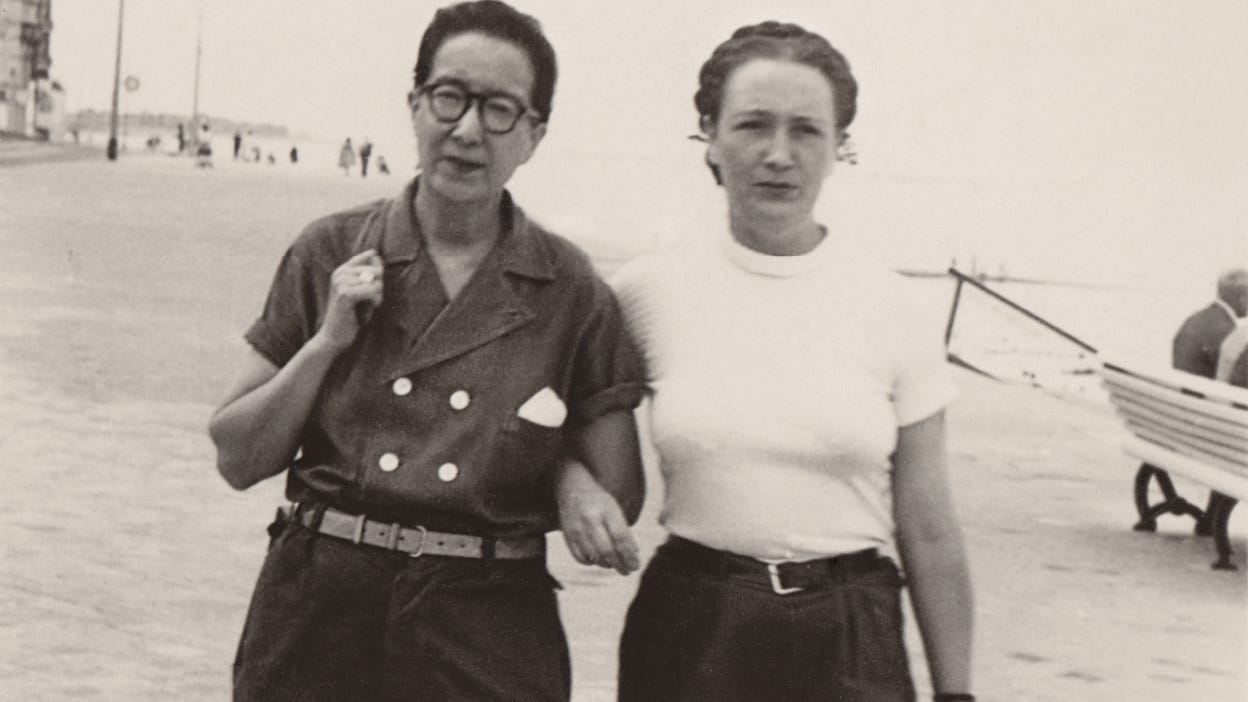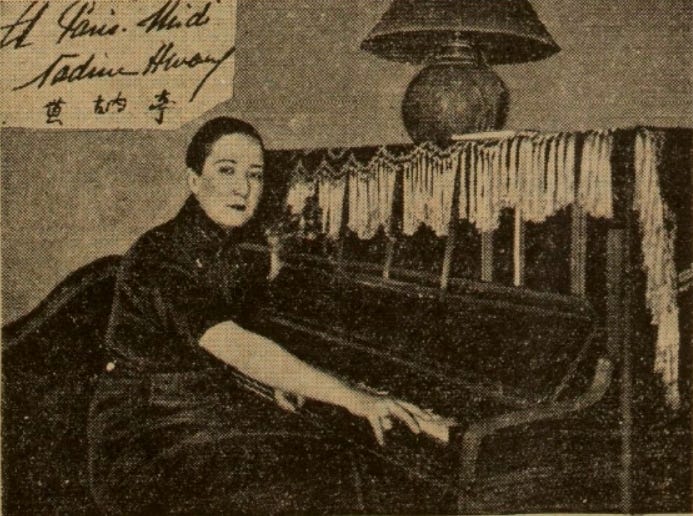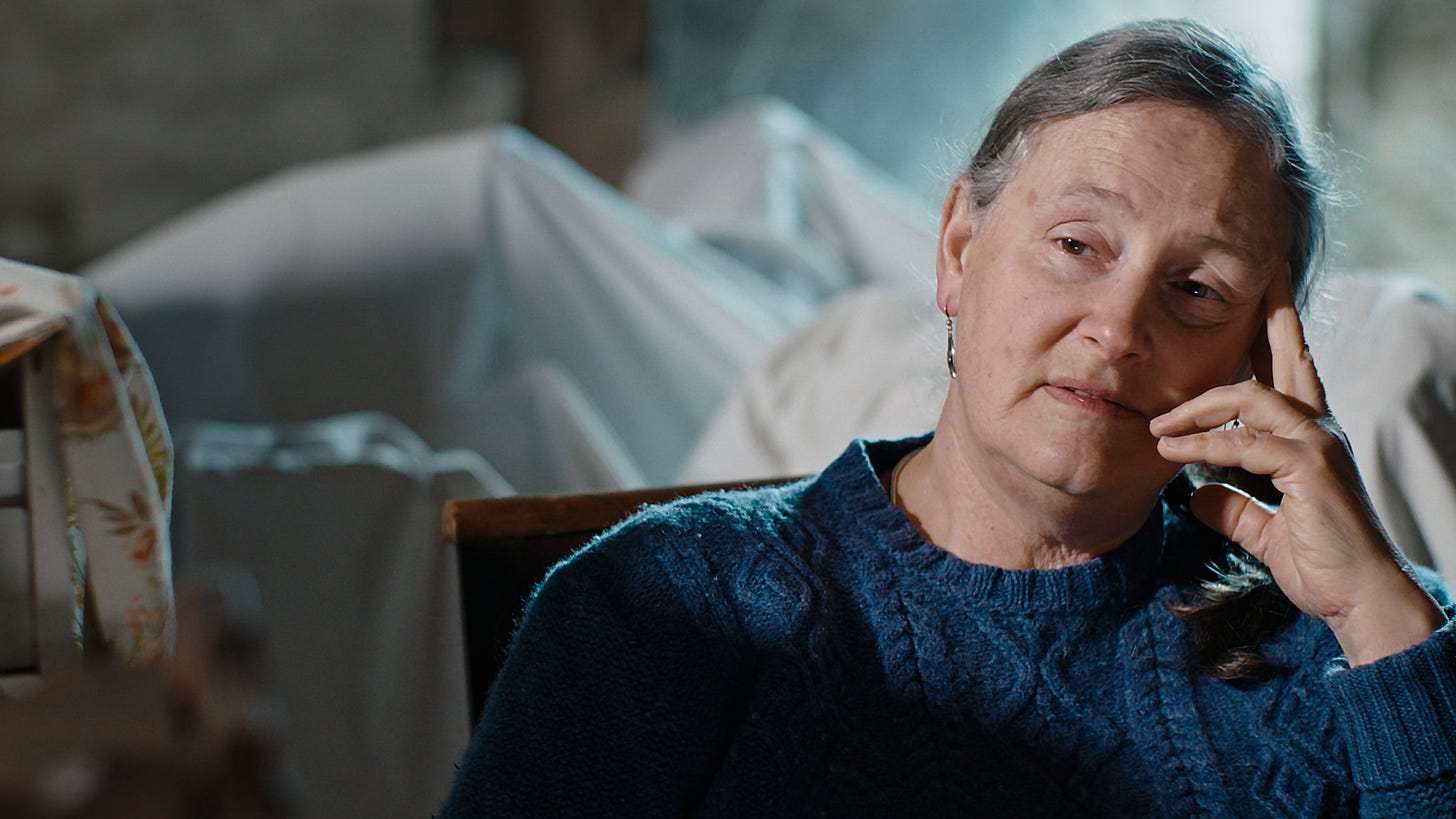Original link: https://sehseh.substack.com/p/0a7
Text / Lin Tingwei
In a Nazi concentration camp in Germany, Nelly. Nelly Mousset-Vos meets the love of her life.
On Christmas Eve in 1944, the female prisoners of the concentration camp gathered around the warm fire to celebrate Christmas. Nelly and a group of French female prisoners sang Christmas carols. In the darkness, a voice shouted, “Sing the song “Mrs. Butterfly”!” Nelly, who is good at opera, sang “A Beautiful Day” at the request of the audience. After singing, Nelly felt that her cheek was kissed twice, and when she looked closely, an oriental beauty like Madam Butterfly was standing in front of her.
“She has black hair, hyacinth eyes, and ivory-white skin. Her name is Nating.” Nelly wrote in her diary the scene of her first encounter with her lover. Puccini’s opera masterpiece “Madame Butterfly” is about a love story between an American officer and a Japanese geisha across ethnicities; however, the play ends with the officer marrying another person and the geisha committing suicide, while Nelly and her The “Mrs. Butterfly” was able to stay together for life.
The love story of Nellie and Nadine Hwang begins here.
The World Walk has important stories you haven’t read yet. We focus on global issues from a gender perspective, complementing stories of dilemma, breakthrough, connection, and change that traditional power perspectives ignore.
Please pay a subscription to become our partner and walk with women around the world.
“Every face has a name”
Between 1933 and 1945, the Nazi regime established thousands of concentration camps in Germany and in the occupied territories, where the regime’s perceived enemies—first dissidents against the Jews, Roma, political prisoners, homosexuals, people with disabilities, people of certain religious beliefs, the poor, etc.—all were held in concentration camps, subjected to beatings, forced labor, human experiments, and even brutal executions.
At the end of World War II, the Swedish Red Cross and the Danish government launched the White Buses rescue operation. Beginning in the spring of 1945, more than 300 volunteers and white buses painted with red crosses ventured through areas bombed by the Allies to the concentration camps to transport prisoners to neutral Sweden for resettlement. Over the years, Swedish director Magnus. Magnus Gertten is dedicated to uncovering the identities of the survivors of the concentration camps rescued by the “white bus”, putting names and life histories on many unknown faces.
In a video of a female prisoner from a concentration camp being rescued and disembarking in Malmö, Sweden, Gotten discovered the Asian-faced Huang Nating. Huang Nating was the daughter of Huang Luhe, the Chinese ambassador to Spain in the early 20th century. She grew up in high society in Europe and China, and was active in Paris’s social circle of artistic women as an adult until she was arrested and sent to a concentration camp in 1944.
Although Gotten found many survivors who appeared in the film and their descendants, and made a documentary “Every Face Has A Name” (Every Face Has A Name) , Gotten never found Huang Nating’s post-war picture. Whereabouts——Why did the diplomat’s daughter enter the concentration camp? When she got off the ship at the port and regained her freedom, what was she thinking about, frowning slightly, and thinking?
On April 28, 1945, a boat carrying survivors of the concentration camp docked in Malmö, Sweden. Swedish photographers captured the moment when thousands of female prisoners disembarked, including Huang Nating (right), with short hair and an East Asian face. two).
Through the relics left by Nellie, Gerten found part of the answer.
Nelly’s concentration camp diary, photos of the two, testimonies of friends of the parties involved, and even life images taken by Huang Nating… These materials form the two main narrative lines of “Secrets in the Attic”: one is Nelly’s concentration camp diary The capitalized history of the war is reflected, and the other is that Nellie’s gray-haired granddaughter Sylvia ran around looking for clues, trying to piece together the lowercase personal history of Nellie and Nating.
Under the capital history, who are they?
“I only know that my grandmother was in a concentration camp, and the two met there, and later lived in Venezuela together,” recalls Sylvia, who has been visiting Venezuelan capital Caracas with her mother since she was four years old. Grandma, and Nating’s existence is like “a roommate who happens to live there too”. The family never mentioned who Nating was or what their relationship was. Xi Lewei only remembered: “My mother doesn’t like Nating.”
After reading Nelly’s diary and visiting biographers, Xi Lewei realized that Neating was not just “grandmother’s roommate”.
Huang Nating was born in 1902. His father was the Chinese ambassador to Spain and his mother was Belgian. She traveled around with her diplomat father since she was a child, and received a good education. With a lively personality and proficient in various languages, she is a figure in the Beijing social circle, and she often goes out to fashionable occasions such as balls. She also attended a military academy and worked as a secretary in the Beiyang government, responsible for exchanges between China and Europe. After leaving his military post in China, 30-year-old Huang Nating returned to Europe and settled in Paris. The small photo album left by Nating shows that the close contacts in her life include the Polish princess and the American writer Natalie. Celebrities like Natalie Barney .
Barney is an open lesbian feminist. In order to support female writers and artists, she organized her own literary salon in Paris and founded an art and cultural group called “Académie des Femmes” (Académie des Femmes), which lasted for 63 years. cease. Here, Huang Nating is not only a well-known figure, but also Barney’s secretary, driver and lover — one of many lovers.
As Xi Lewei gradually uncovered the mystery of Nating, she also found that she did not know her grandmother Nelly.
Born in 1906, Nelly is a Belgian singer who will hold concert tours in Paris, Zurich, Milan and other places from time to time, singing French or Italian opera masterpieces. She and her husband divorced in the late 1930s, at a time when the prelude to war was brewing across Europe. The Nazis occupied Austria, Czechoslovakia, Lithuania, Poland in 1938 and invaded Belgium in May 1940. Wherever the German army occupied, there were many local resistance movements.
In the archives of war victims in Brussels, Sylvie and her sister were surprised to discover that their grandmother was part of the Belgian resistance.
At the end of the year that Belgium fell, Nelly became an intelligence agent for the underground resistance. She used her singer’s identity as a cover to collect information for the “Luc” intelligence network (Luc, later renamed “Zero”), until Nelly was arrested in Paris by the Gestapo for espionage in 1943. After touring prisons in France and Germany, she was transferred to Ravensbrück concentration camp and Mauthausen concentration camp, where she was held for 735 days before being released.
The place where Nellie and Nating met was the Ravensbrück concentration camp in Germany, where female political prisoners were mainly held. After Nelly was transferred to Mauthausen, the two were forced to separate and did not reunite until a year after the war ended. They were all rescued from Operation White Bus.
her/their secret love
Sylvia unearthed more and more clues. Huang Nating shot a large number of film films, in which the two people lived in Venezuela. Sprinkled on her beautiful features and printed dress; friends came to their house for a happy party, and male friends named Jack and Raymond slapped each other intimately…
In Venezuela, they have spent more than 30 years together. After moving back to Belgium in his later years, Natin and Nelly died in 1972 and 1987, respectively.
Sylvia dug out the original diary that Nelly had written with pencil and paper in the concentration camp, Nating’s handwritten documents, and the two of them re-typed their memoirs on a typewriter, saying, “They want to explain their love story, and in the The Ravensrück meeting, and this love—but no one wants to publish a memoir. How could that be?”
In an era when same-sex love was not recognized by society, how many queer people, like Nellie and Nating, could only keep their love stories in the attic?
In the documentary, Sylvia went to Madrid, Spain to visit their friend Rovira in Venezuela. He recalled that Nelly and Nating referred to each other as “cousins”, “In our opinion, this (the title) is very natural, not deliberately concealing (the relationship)”, but it is more convenient to say this, “but there are more differences between them. Something profound, beyond mere emotional expression.”
Later, Rovira’s daughter Maria visited Sylvie in private. She revealed that although her father married her mother, he had another male lover who had been living a double life.
Judging from the video shot by Huang Nating, Rovira seems to be more able to “be herself” at their apartment party, interacting with male friends freely and intimately. “I started thinking about myself, my sexuality. I wanted to live like theirs, I didn’t want to be a two-faced person,” Maria felt after watching Nating’s film about her father.
“I can understand it must have been difficult to live so openly in those days. I kept telling him, ‘Look at Jack and Raymond, Nellie and Natin, you see they did it, they’re doing well. Allow you to Live for yourself.” (End)
Subscribe to the Walk Around Newsletter and we’ll deliver:
[Members only] Go original: a good story that others have not written yet
An Evening News Every Day: A selection of daily news summaries for you
Weekly Newsletter: Good articles from around the world that you may have missed
A Weekly Note: A Weekly Guide to Online Activities
【Exclusive benefits for other members】» See here
This article is reprinted from: https://sehseh.substack.com/p/0a7
This site is for inclusion only, and the copyright belongs to the original author.



